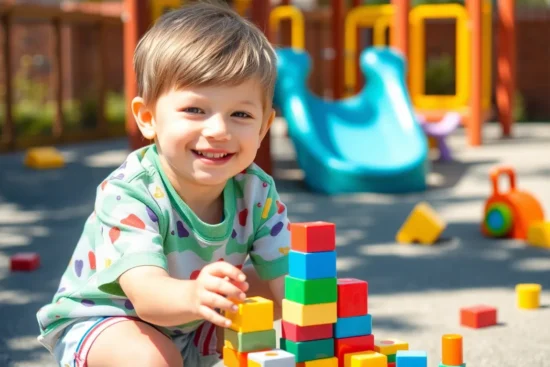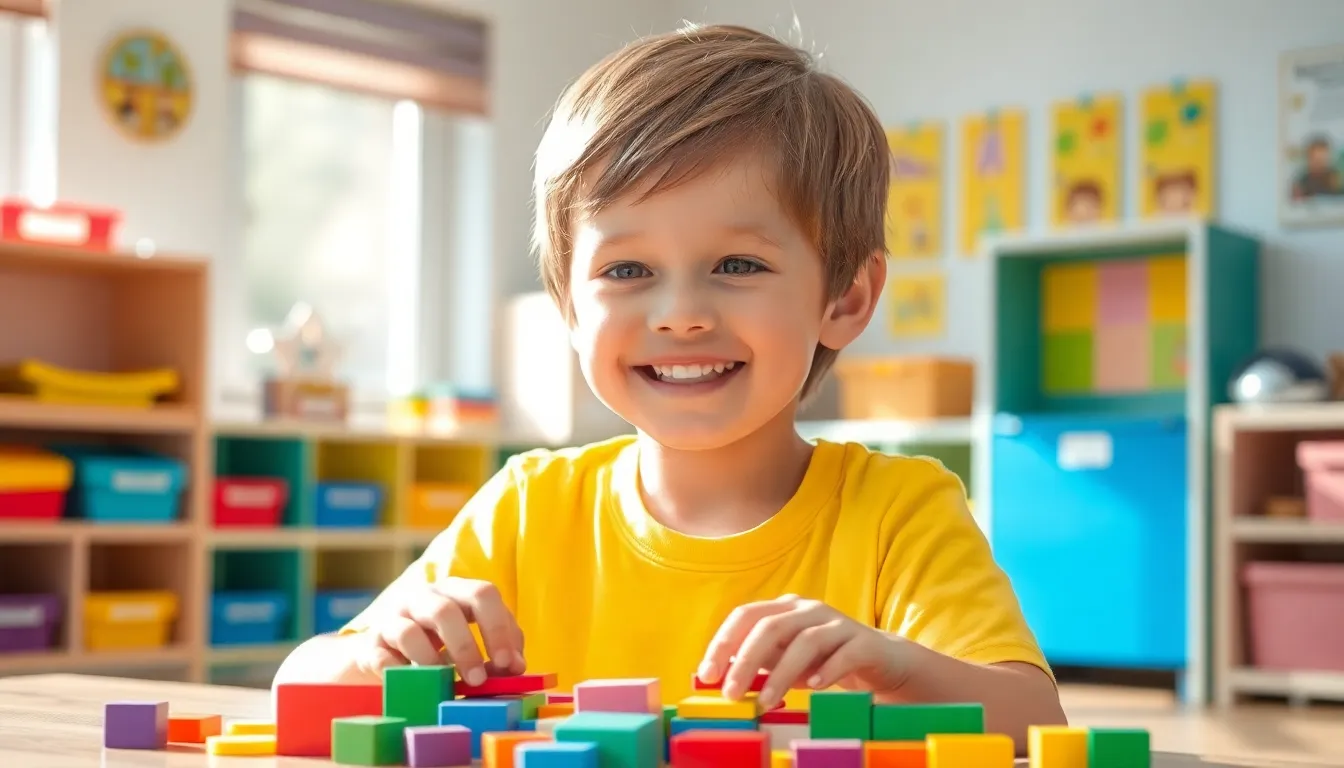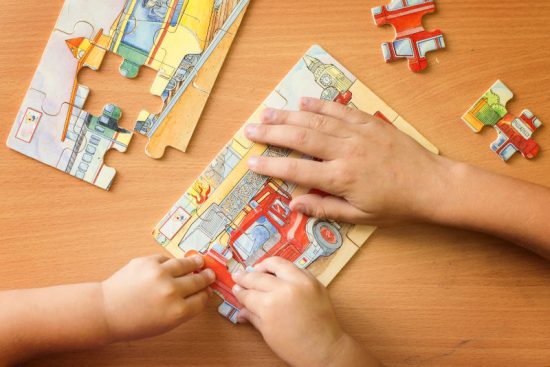
As five-year-olds bounce into the world with boundless energy and curiosity, parents often wonder what essential skills their little ones should have under their tiny belts. After all, these pint-sized adventurers are on a quest for knowledge that rivals even the most seasoned explorers. From counting to crafting a convincing argument about why bedtime should be optional, it’s a wild ride filled with giggles and learning.
What Should A 5 Year Old Know
Five-year-olds reach several key developmental milestones that encompass various domains, including cognitive, social, emotional, and physical growth. Cognitive skills include the ability to count to 20 and recognize numbers up to 10. Children can understand basic concepts of time, such as day and night, and can follow simple multi-step directions.
Socially, children begin to form friendships, sharing toys and taking turns during play. They express feelings and understand emotions, both their own and those of others. Engaging in imaginative play demonstrates their growing creativity and ability to cooperate with peers.
Emotionally, five-year-olds show a stronger sense of independence. They demonstrate confidence when trying new activities and may articulate preferences for certain tasks or games. Recognizing their feelings when faced with challenges is also an important aspect of emotional development.
Physically, children exhibit increased coordination and control over their movements. They can hop on one foot and catch a ball with both hands. Skills related to fine motor development become evident as they can use scissors to cut simple shapes and write some letters of their names.
Language skills expand significantly at this age. Five-year-olds typically speak in complete sentences and can convey thoughts clearly. Using appropriate grammar and expanding vocabulary enriches their communication abilities, making it easier for them to express their needs and ideas.
Overall, these milestones illustrate the incredible growth that occurs during this pivotal time, providing a foundation for future learning and interaction in the world.
Cognitive Skills

Five-year-olds exhibit remarkable cognitive abilities as they learn and grow. This stage focuses on building foundational skills necessary for future learning.
Basic Math Concepts
Children at this age can typically count to 20 with ease. They recognize numbers up to 10, allowing for simple addition and subtraction. Understanding basic concepts such as more than, less than, and equal becomes essential. They often use objects to visualize problems, making learning interactive. Engaging in everyday activities like counting toys or snacks helps reinforce these concepts. Sorting shapes and sizes also enhances their grasp of basic geometry.
Language Development
Language skills expand significantly during this age. Five-year-olds can form complete sentences and use language to express thoughts and feelings. They frequently ask questions, showing curiosity about their environment. Vocabulary grows to include around 1,500 words, enabling richer conversations. Children start using appropriate grammar, though mistakes often occur. Storytelling becomes a favorite activity, encouraging creativity and comprehension. Listening to stories helps them understand narrative structure and develop critical thinking skills.
Social Skills
Social skills form a crucial part of a five-year-old’s development. Children learn to interact with others effectively, which is essential for forming lasting relationships.
Sharing and Cooperation
Sharing toys and taking turns represents key aspects of social interaction. Children understand the concept of cooperation through group play and collaborative activities. Engaging in playdates or organized group activities teaches them to navigate social dynamics. They learn the importance of compromise and negotiation when disagreements arise. These experiences help children build trust and establish friendships. Practicing sharing at home or school fosters a sense of community and belonging. Encouraging group projects or games reinforces these cooperative skills, preparing children for future teamwork in more complex environments.
Understanding Emotions
Recognizing and understanding emotions becomes significant at this age. Children develop the ability to identify their own feelings as well as those of others. Discussing feelings through storytelling or role play enhances their emotional vocabulary. They learn to express emotions verbally instead of reacting physically. This understanding helps in managing frustrations during playtime or learning activities. Children also gain empathy by observing others’ reactions, which reinforces social connections. Encouraging conversations about feelings strengthens their emotional intelligence and helps them navigate social situations effectively.
Physical Abilities
Physical abilities at age five encompass both fine motor and gross motor skills. Mastery of these skills supports a child’s independence and confidence in physical activities.
Fine Motor Skills
Fine motor skills exhibit a child’s ability to control small movements. Children at this age typically demonstrate skills like grasping small objects, using scissors, and coloring neatly. They can often manipulate buttons and zippers, reinforcing dexterity. Incorporating activities like drawing or building with blocks enhances coordination. Engaging in crafts further develops these skills, as they learn to thread beads or assemble puzzles. As children refine their fine motor skills, they improve their hand-eye coordination, laying the groundwork for tasks like writing and self-care.
Gross Motor Skills
Gross motor skills reflect coordination of larger muscle groups, enabling activities like running, jumping, and climbing. Children often show agility as they engage in games that require balancing or throwing. At this age, many can hop on one foot and navigate playground equipment independently. Participating in Sports or outdoor play contributes to muscle strength and endurance. Playing tag or riding a tricycle enhances balance and spatial awareness. Developing these gross motor skills establishes a foundation for lifelong physical activity and movement.
Safety Awareness
Safety awareness is crucial for five-year-olds as they explore their environment. They must understand what situations pose potential risks.
Understanding Danger
Understanding danger involves recognizing situations that may be harmful. Children should learn to identify hazards like hot surfaces, sharp objects, and traffic. Engaging in role-playing can help them practice responding to risky scenarios. Parents can point out dangers during daily activities, reinforcing learning. Games that simulate safe behavior also enhance their understanding. Observing adults’ reactions to potential dangers provides important clues. Encouraging questions helps clarify what is safe and unsafe.
Basic Emergency Response
Basic emergency response includes teaching children how to react in emergencies. Knowing to call 911 or seeking help from a trusted adult is vital. Children should memorize their address and parents’ phone numbers. Role-playing scenarios builds their confidence in these situations. Educating them about fire drills and emergency exits creates familiarity. Practicing responsible behaviors during emergencies reinforces safety. Incorporating fun safety drills at home promotes preparedness. Overall, establishing these responses lays the groundwork for confident decision-making.
Conclusion
Five-year-olds are on an incredible journey of growth and discovery. Their ability to learn through play and everyday experiences lays the groundwork for essential skills that will serve them throughout life. As they develop cognitively, socially, emotionally, and physically, they’re not just reaching milestones but also building confidence and independence.
Fostering an environment that encourages exploration and learning can make a significant difference. By supporting their curiosity and guiding them through social interactions and safety awareness, caregivers can help these young learners thrive. The skills they acquire now will shape their future interactions and understanding of the world around them. Embracing this stage of development is crucial for nurturing well-rounded individuals.




